- Joint Chiefs spokesman says plan "is not a change in mission nor is it a combat role"
- U.S. currently has advisers assisting Iraqis in Irbil and
- Joint Chiefs chairman: Sunni tribes fighting ISIS need Iraqi military support
- ISIS has killed some 400 members of one Sunni tribe in Anbar in recent days
Washington (CNN) -- Pentagon officials are readying a plan that would deploy U.S. military advisers to the volatile Iraqi province of Anbar to advise and assist Iraqi security forces in a region currently dominated by ISIS militants.
"To be clear, this is not a change in mission nor is it a combat role, as they will be operating in the same advisory role as the other locations," Col. Edward Thomas, spokesman for the chairman of the Joint Chiefs of Staff, told CNN.
U.S. advisers currently operate in areas around Baghdad and Irbil in the north of the country. The new proposal would put U.S. troops in the middle of some of the most violent situations in Iraq.
Thomas said the plan is still "under development."
 U.S. advisers may join fight against ISIS
U.S. advisers may join fight against ISIS  ISIS slaughters 45 Iraqi tribesmen
ISIS slaughters 45 Iraqi tribesmen  ISIS allegedly using poison gas
ISIS allegedly using poison gas 
 Fire and smoke rise from the Syrian city of Kobani following airstrikes against the ISIS militant group on Thursday, October 30. ISIS militants and Syrian Kurdish fighters have been battling for control of the city near the Turkish border, and the United States and several Arab nations have been bombing ISIS targets to take out the group's ability to command, train and resupply its fighters.
Fire and smoke rise from the Syrian city of Kobani following airstrikes against the ISIS militant group on Thursday, October 30. ISIS militants and Syrian Kurdish fighters have been battling for control of the city near the Turkish border, and the United States and several Arab nations have been bombing ISIS targets to take out the group's ability to command, train and resupply its fighters.  Iraqi special forces search a house in Jurf al-Sakhar, Iraq, on October 30 after retaking the area from ISIS. ISIS has been advancing in Iraq and Syria as it seeks to create an Islamic caliphate in the region.
Iraqi special forces search a house in Jurf al-Sakhar, Iraq, on October 30 after retaking the area from ISIS. ISIS has been advancing in Iraq and Syria as it seeks to create an Islamic caliphate in the region. 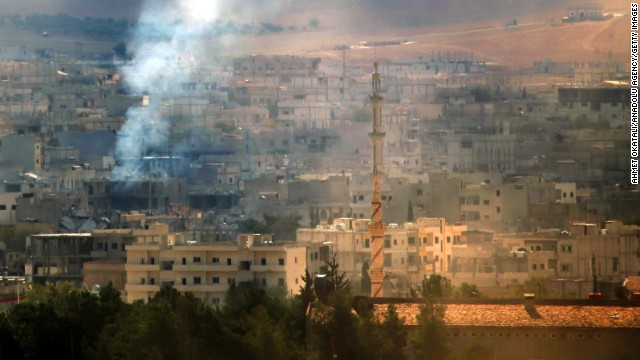 Smoke rises during fighting in Kobani on Monday, October 27.
Smoke rises during fighting in Kobani on Monday, October 27.  ISIS militants stand near the site of an airstrike near the Turkey-Syria border on Thursday, October 23.
ISIS militants stand near the site of an airstrike near the Turkey-Syria border on Thursday, October 23. 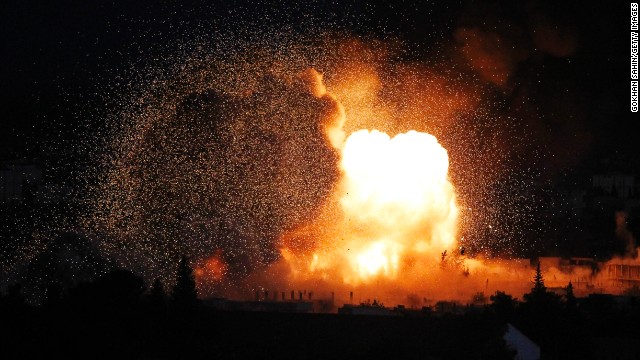 An explosion rocks Kobani during a reported car-bomb attack by ISIS militants on Monday, October 20.
An explosion rocks Kobani during a reported car-bomb attack by ISIS militants on Monday, October 20. 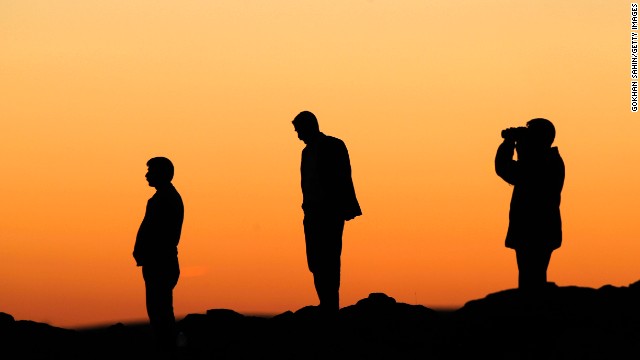 People watch Kobani from a hill near the Turkey-Syria border on October 20.
People watch Kobani from a hill near the Turkey-Syria border on October 20. 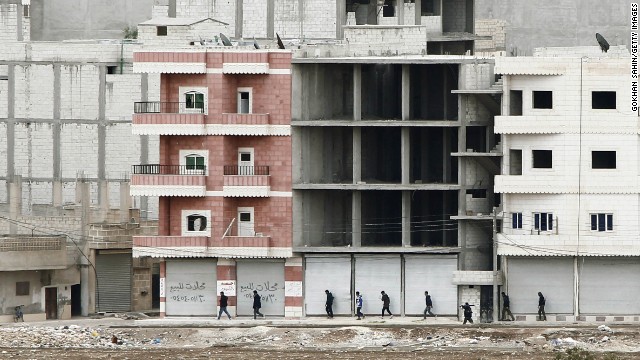 Kurdish fighters walk to positions as they fight ISIS forces in Kobani on Sunday, October 19.
Kurdish fighters walk to positions as they fight ISIS forces in Kobani on Sunday, October 19. 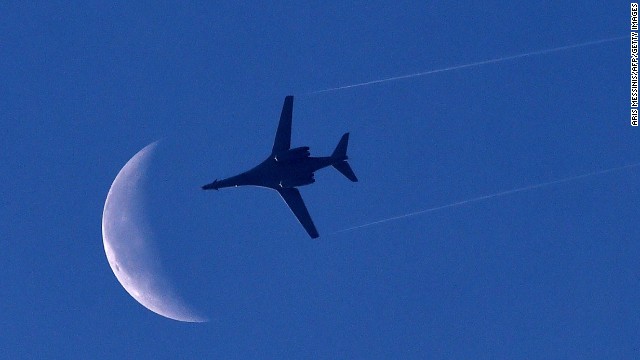 A U.S. Air Force plane flies above Kobani on Saturday, October 18.
A U.S. Air Force plane flies above Kobani on Saturday, October 18. 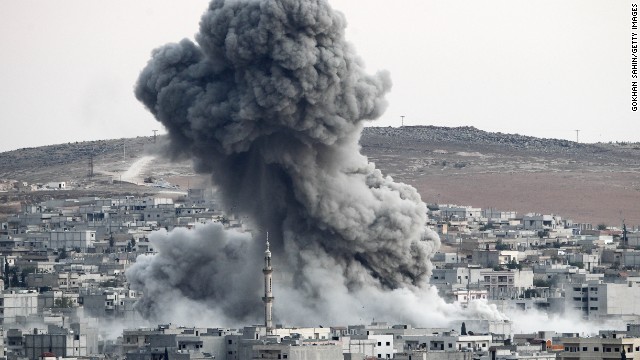 Heavy smoke rises in Kobani following an airstrike by the U.S.-led coalition on Saturday, October 18.
Heavy smoke rises in Kobani following an airstrike by the U.S.-led coalition on Saturday, October 18.  Cundi Minaz, a female Kurdish fighter, is buried in a cemetery in the southeastern Turkish town of Suruc on Tuesday, October 14. Minaz was reportedly killed during clashes with ISIS militants in nearby Kobani.
Cundi Minaz, a female Kurdish fighter, is buried in a cemetery in the southeastern Turkish town of Suruc on Tuesday, October 14. Minaz was reportedly killed during clashes with ISIS militants in nearby Kobani. 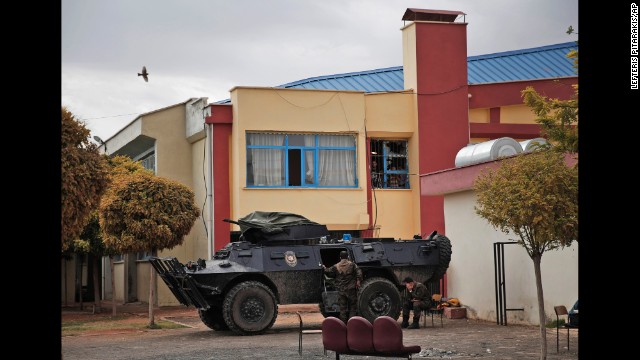 Turkish police officers secure a basketball stadium in Suruc on October 14. Some Syrian Kurds have been held there since crossing from Syria into Turkey. Tens of thousands of people have fled Kobani, known in Arabic as Ayn al-Arab, to escape ISIS.
Turkish police officers secure a basketball stadium in Suruc on October 14. Some Syrian Kurds have been held there since crossing from Syria into Turkey. Tens of thousands of people have fled Kobani, known in Arabic as Ayn al-Arab, to escape ISIS. 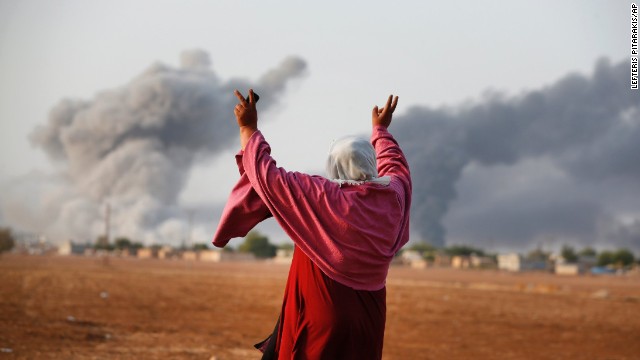 Kiymet Ergun, a Syrian Kurd, celebrates in Mursitpinar, Turkey, after an airstrike by the U.S.-led coalition in Kobani on Monday, October 13.
Kiymet Ergun, a Syrian Kurd, celebrates in Mursitpinar, Turkey, after an airstrike by the U.S.-led coalition in Kobani on Monday, October 13. 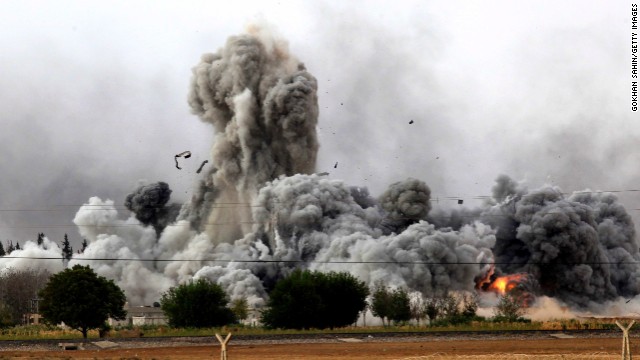 Smoke rises from Kobani on Sunday, October 12.
Smoke rises from Kobani on Sunday, October 12. 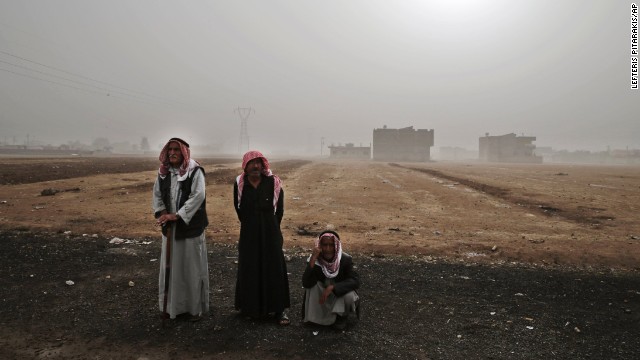 Syrian Kurds from Kobani stand outside the grounds of a refugee camp in Suruc on Saturday, October 11.
Syrian Kurds from Kobani stand outside the grounds of a refugee camp in Suruc on Saturday, October 11. 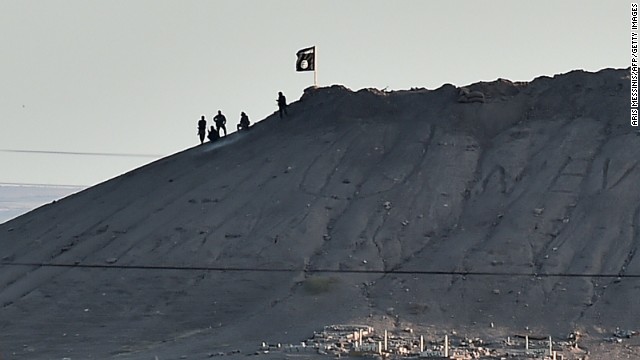 Alleged ISIS militants stand next to an ISIS flag atop a hill in Kobani on Monday, October 6.
Alleged ISIS militants stand next to an ISIS flag atop a hill in Kobani on Monday, October 6. 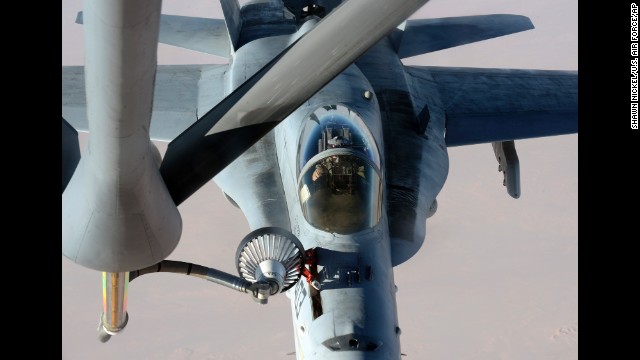 In this photo released by the U.S. Air Force on Saturday, October 4, a U.S. Navy jet is refueled in Iraqi airspace after conducting an airstrike against ISIS militants.
In this photo released by the U.S. Air Force on Saturday, October 4, a U.S. Navy jet is refueled in Iraqi airspace after conducting an airstrike against ISIS militants. 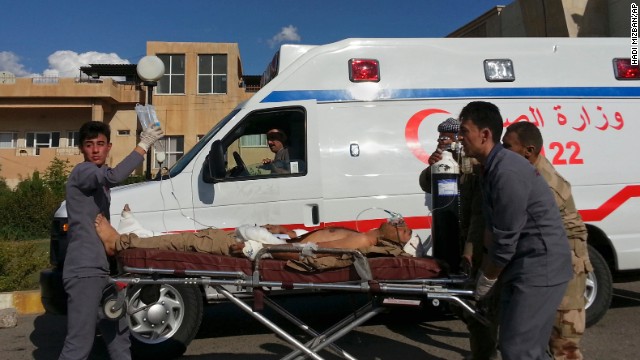 A Kurdish Peshmerga soldier who was wounded in a battle with ISIS is wheeled to the Zakho Emergency Hospital in Duhuk, Iraq, on Tuesday, September 30.
A Kurdish Peshmerga soldier who was wounded in a battle with ISIS is wheeled to the Zakho Emergency Hospital in Duhuk, Iraq, on Tuesday, September 30. 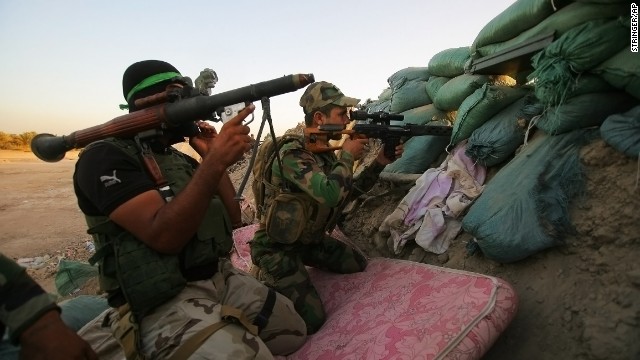 Iraqi Shiite militiamen aim their weapons during clashes with ISIS militants in Jurf al-Sakhar on Sunday, September 28.
Iraqi Shiite militiamen aim their weapons during clashes with ISIS militants in Jurf al-Sakhar on Sunday, September 28.  Syrian Kurds wait near a border crossing in Suruc as they wait to return to their homes in Kobani on Sunday, September 28. Tens of thousands of people have fled Kobani, known in Arabic as Ayn al-Arab, to escape ISIS.
Syrian Kurds wait near a border crossing in Suruc as they wait to return to their homes in Kobani on Sunday, September 28. Tens of thousands of people have fled Kobani, known in Arabic as Ayn al-Arab, to escape ISIS. 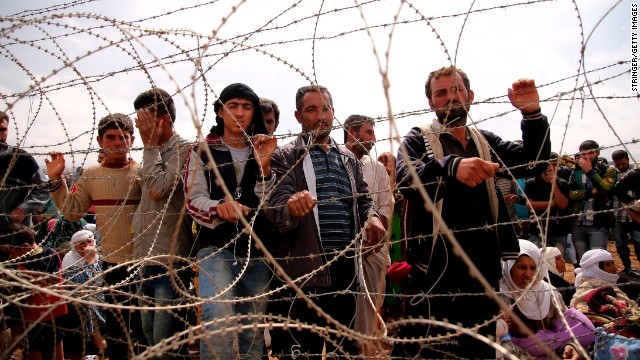 Syrian Kurds wait behind border fences to cross into Suruc on September 28.
Syrian Kurds wait behind border fences to cross into Suruc on September 28. 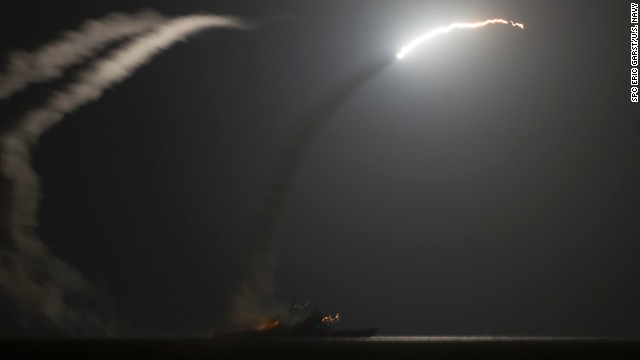 Tomahawk missiles, intended for ISIS targets in Syria, fly above the Persian Gulf after being fired by the USS Philippine Sea in this image released by the U.S. Navy on Tuesday, September 23.
Tomahawk missiles, intended for ISIS targets in Syria, fly above the Persian Gulf after being fired by the USS Philippine Sea in this image released by the U.S. Navy on Tuesday, September 23. 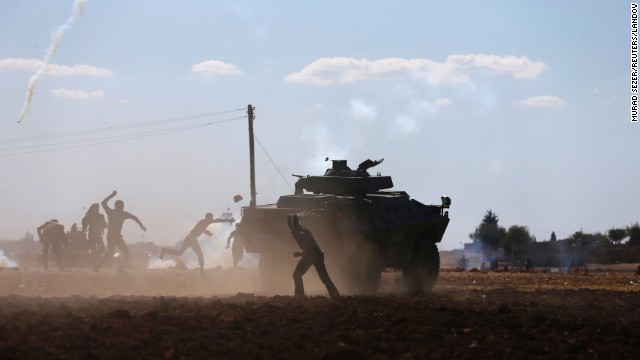 Turkish Kurds clash with Turkish security forces during a protest near Suruc on Monday, September 22. According to Time magazine, the protests were over Turkey's temporary decision to close the border with Syria.
Turkish Kurds clash with Turkish security forces during a protest near Suruc on Monday, September 22. According to Time magazine, the protests were over Turkey's temporary decision to close the border with Syria.  Syrian Kurds fleeing ISIS militants wait behind a fence in Suruc on Sunday, September 21.
Syrian Kurds fleeing ISIS militants wait behind a fence in Suruc on Sunday, September 21. 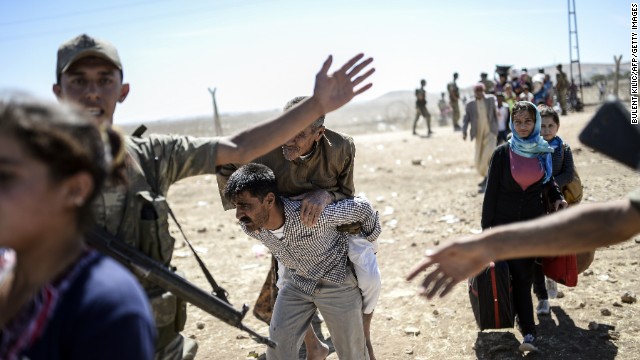 A elderly man is carried after crossing the Syria-Turkey border near Suruc on Saturday, September 20.
A elderly man is carried after crossing the Syria-Turkey border near Suruc on Saturday, September 20. 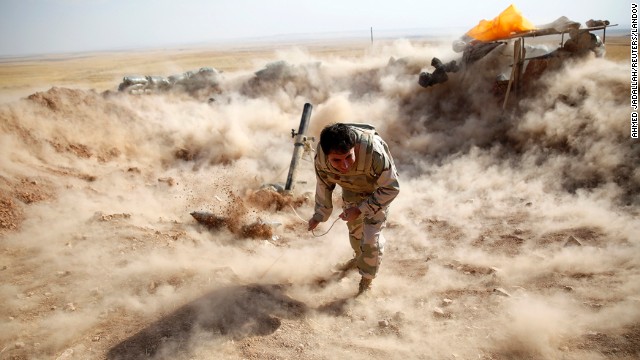 A Kurdish Peshmerga fighter launches mortar shells toward ISIS militants in Zumar, Iraq, on Monday, September 15.
A Kurdish Peshmerga fighter launches mortar shells toward ISIS militants in Zumar, Iraq, on Monday, September 15. 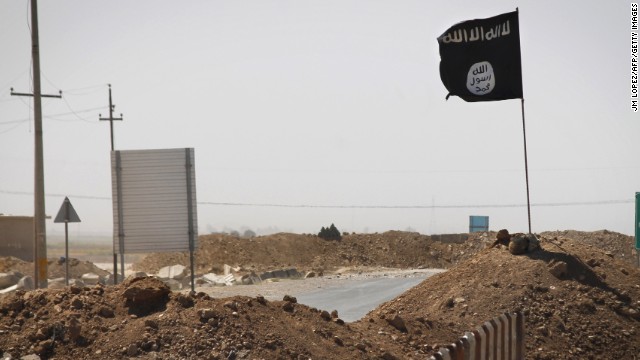 An ISIS flag flies on the other side of a bridge at the front line of fighting between ISIS and Kurdish Peshmerga fighters in Rashad, Iraq, on Thursday, September 11.
An ISIS flag flies on the other side of a bridge at the front line of fighting between ISIS and Kurdish Peshmerga fighters in Rashad, Iraq, on Thursday, September 11. 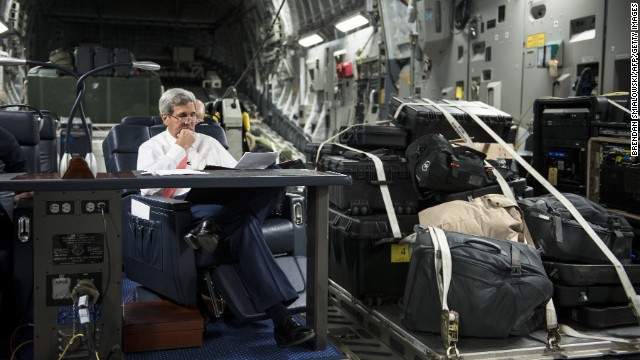 U.S. Secretary of State John Kerry reads on a flight en route to Iraq on Wednesday, September 10. Kerry traveled to the Mideast to discuss ways to bolster the stability of the new Iraqi government and combat ISIS.
U.S. Secretary of State John Kerry reads on a flight en route to Iraq on Wednesday, September 10. Kerry traveled to the Mideast to discuss ways to bolster the stability of the new Iraqi government and combat ISIS. 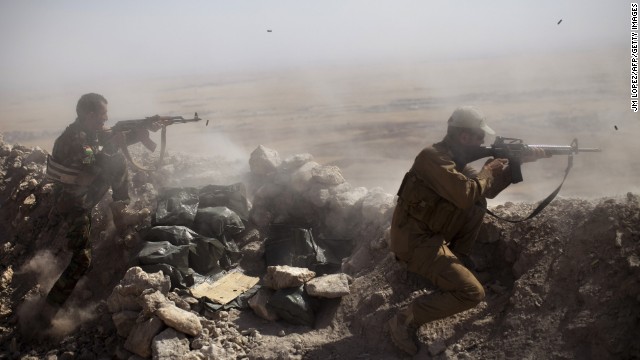 Kurdish Peshmerga fighters fire at ISIS militant positions from their position on the top of Mount Zardak, east of Mosul, Iraq, on Tuesday, September 9.
Kurdish Peshmerga fighters fire at ISIS militant positions from their position on the top of Mount Zardak, east of Mosul, Iraq, on Tuesday, September 9.  An Iraqi fighter jet flies over Amerli, Iraq, on September 3. Amerli had been under siege by ISIS militants.
An Iraqi fighter jet flies over Amerli, Iraq, on September 3. Amerli had been under siege by ISIS militants. 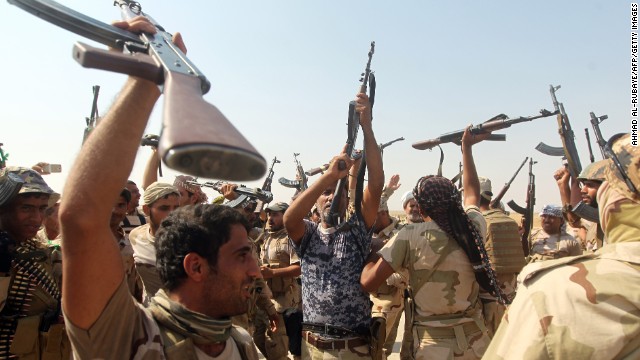 Iraqi volunteer fighters celebrate breaking the Amerli siege on Monday, September 1. ISIS militants had surrounded Amerli, 70 miles north of Baquba, Iraq, since mid-June.
Iraqi volunteer fighters celebrate breaking the Amerli siege on Monday, September 1. ISIS militants had surrounded Amerli, 70 miles north of Baquba, Iraq, since mid-June. 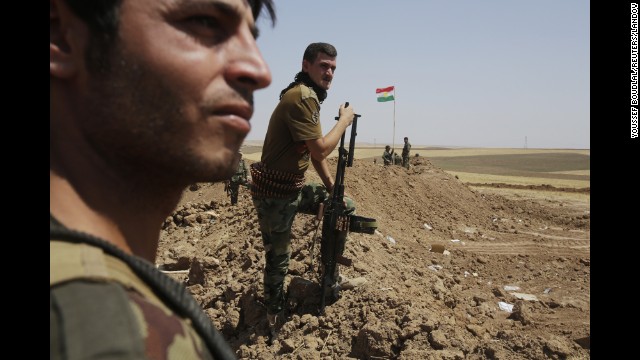 Kurdish Peshmerga forces stand guard at their position in the Omar Khaled village west of Mosul on Sunday, August 24.
Kurdish Peshmerga forces stand guard at their position in the Omar Khaled village west of Mosul on Sunday, August 24. 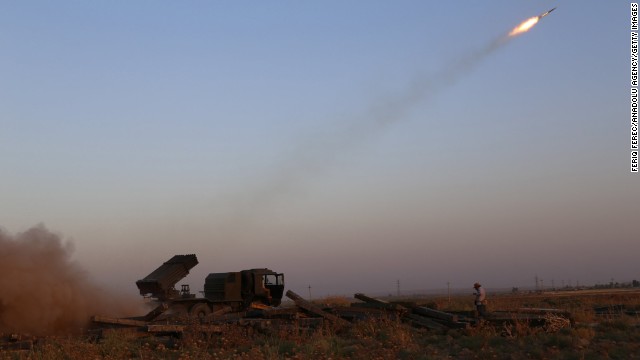 Kurdish Peshmergas fight to regain control of the town of Celavle, in Iraq's Diyala province, on August 24.
Kurdish Peshmergas fight to regain control of the town of Celavle, in Iraq's Diyala province, on August 24. 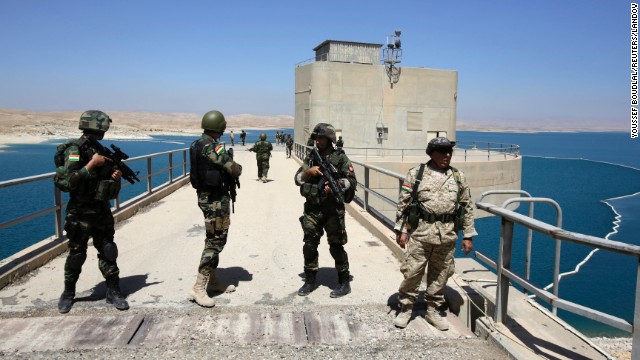 Peshmerga fighters stand guard at Mosul Dam in northern Iraq on Thursday, August 21. With the help of U.S. military airstrikes, Kurdish and Iraqi forces retook the dam from ISIS militants on August 18. A breach of the dam would have been catastrophic for millions of Iraqis who live downstream from it.
Peshmerga fighters stand guard at Mosul Dam in northern Iraq on Thursday, August 21. With the help of U.S. military airstrikes, Kurdish and Iraqi forces retook the dam from ISIS militants on August 18. A breach of the dam would have been catastrophic for millions of Iraqis who live downstream from it.  Displaced Iraqis receive clothes from a charity at a refugee camp near Feeshkhabour, Iraq, on Tuesday, August 19.
Displaced Iraqis receive clothes from a charity at a refugee camp near Feeshkhabour, Iraq, on Tuesday, August 19. 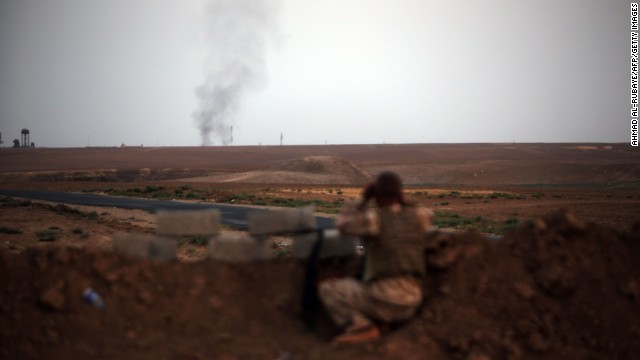 A fighter with Kurdish Peshmerga forces battles ISIS militants near Mosul on Monday, August 18.
A fighter with Kurdish Peshmerga forces battles ISIS militants near Mosul on Monday, August 18. 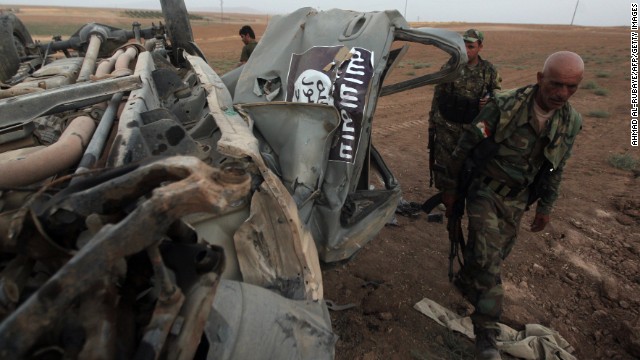 Peshmerga fighters inspect the remains of a car that reportedly belonged to ISIS militants and was targeted by a U.S. airstrike in the village of Baqufa, north of Mosul, on August 18.
Peshmerga fighters inspect the remains of a car that reportedly belonged to ISIS militants and was targeted by a U.S. airstrike in the village of Baqufa, north of Mosul, on August 18. 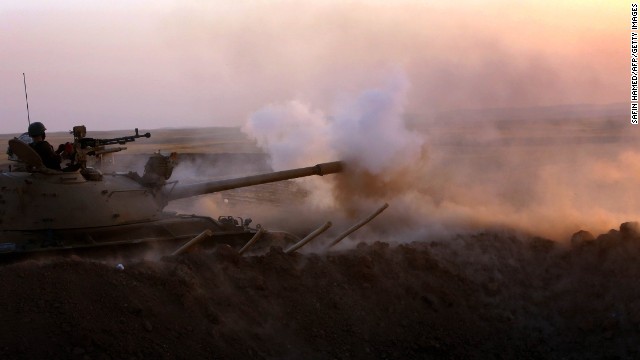 Kurdish Peshmerga fighters fire at ISIS in Khazair, Iraq, on Thursday, August 14.
Kurdish Peshmerga fighters fire at ISIS in Khazair, Iraq, on Thursday, August 14. 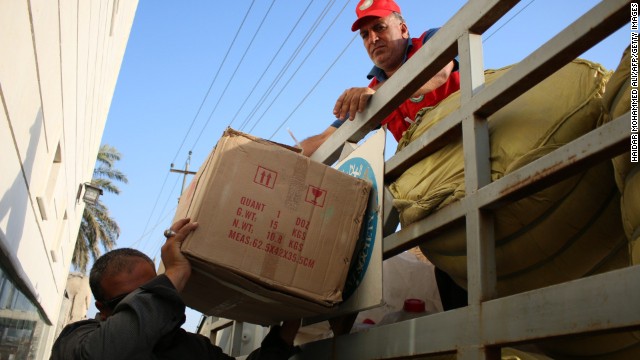 Volunteers of the Iraqi Red Crescent Society unload boxes of goods before distributing them August 14 to families who fled from ISIS.
Volunteers of the Iraqi Red Crescent Society unload boxes of goods before distributing them August 14 to families who fled from ISIS. 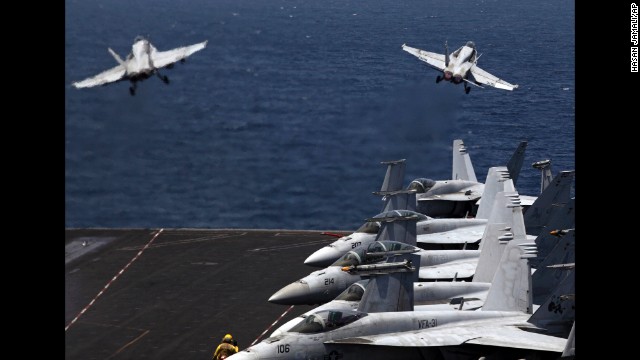 From the flight deck of the USS George H.W. Bush, which is in the Persian Gulf, two U.S. fighter jets take off for a mission in Iraq on Monday, August 11. U.S. President Barack Obama authorized airstrikes against Islamic militants and food drops for Iraqis who are trapped by the militants.
From the flight deck of the USS George H.W. Bush, which is in the Persian Gulf, two U.S. fighter jets take off for a mission in Iraq on Monday, August 11. U.S. President Barack Obama authorized airstrikes against Islamic militants and food drops for Iraqis who are trapped by the militants. 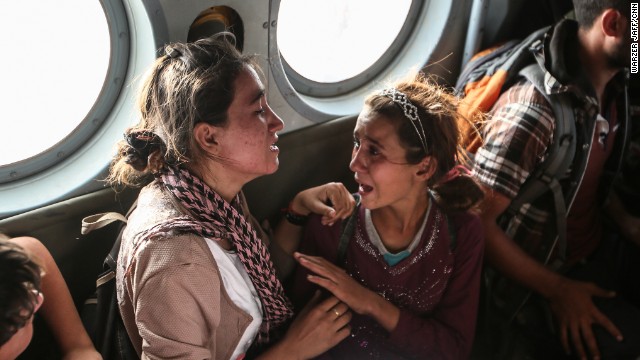 Aziza Hamid, a 15-year-old Iraqi girl, cries for her father while she and some other Yazidi people are flown to safety Monday, August 11, after a dramatic rescue operation at Iraq's Mount Sinjar. A CNN crew was on the flight, which took diapers, milk, water and food to the site where as many as 70,000 people were trapped by ISIS. But only a few of them were able to fly back on the helicopter with the Iraqi Air Force and Kurdish Peshmerga fighters.
Aziza Hamid, a 15-year-old Iraqi girl, cries for her father while she and some other Yazidi people are flown to safety Monday, August 11, after a dramatic rescue operation at Iraq's Mount Sinjar. A CNN crew was on the flight, which took diapers, milk, water and food to the site where as many as 70,000 people were trapped by ISIS. But only a few of them were able to fly back on the helicopter with the Iraqi Air Force and Kurdish Peshmerga fighters. 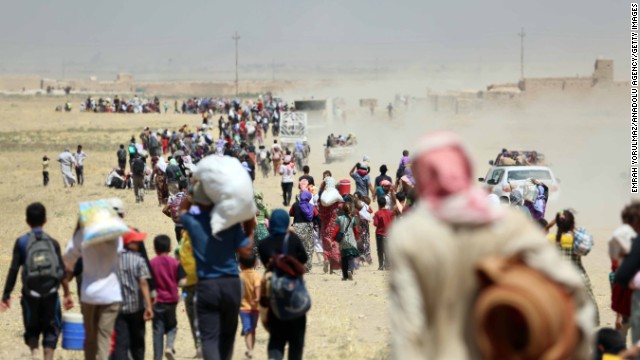 Thousands of Yazidis are escorted to safety by Kurdish Peshmerga forces and a People's Protection Unit in Mosul on Saturday, August 9.
Thousands of Yazidis are escorted to safety by Kurdish Peshmerga forces and a People's Protection Unit in Mosul on Saturday, August 9. 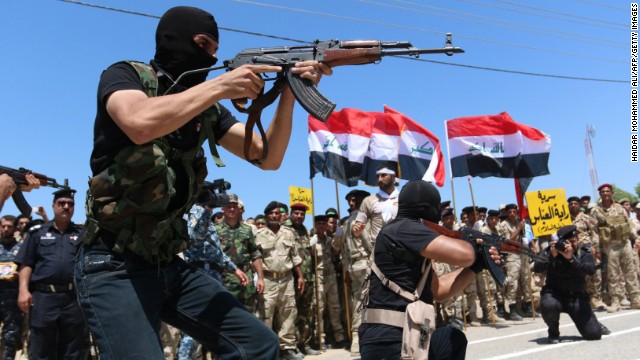 Iraqi Shiite volunteers who have joined government forces to fight ISIS take part in a training session near Basra, Iraq, on Thursday, August 7.
Iraqi Shiite volunteers who have joined government forces to fight ISIS take part in a training session near Basra, Iraq, on Thursday, August 7. 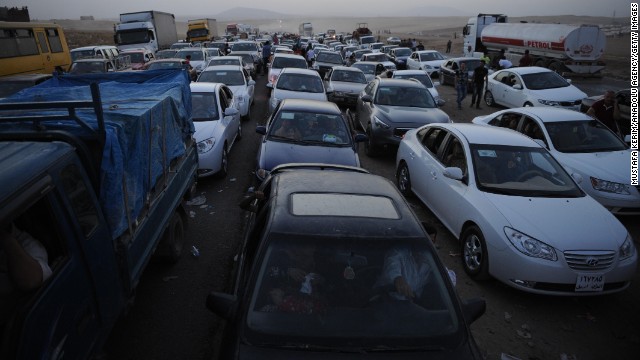 Thousands of Yazidi and Christian people flee Mosul on Wednesday, August 6, after the latest wave of ISIS advances.
Thousands of Yazidi and Christian people flee Mosul on Wednesday, August 6, after the latest wave of ISIS advances. 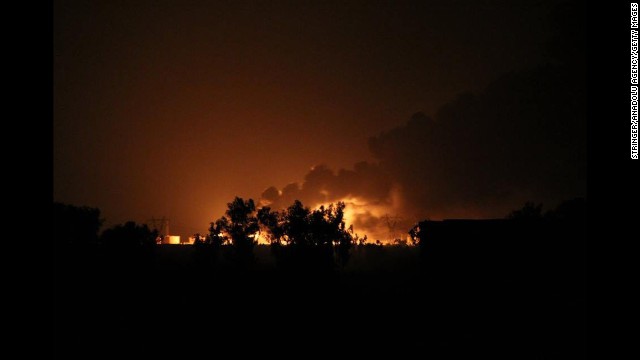 A Baiji oil refinery burns after an alleged ISIS attack in northern Selahaddin, Iraq, on Thursday, July 31.
A Baiji oil refinery burns after an alleged ISIS attack in northern Selahaddin, Iraq, on Thursday, July 31. 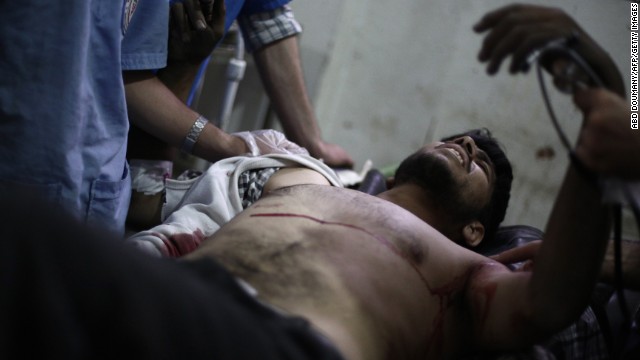 A Syrian rebel fighter lies on a stretcher at a makeshift hospital in Douma, Syria, on Wednesday, July 9. He was reportedly injured while fighting ISIS militants.
A Syrian rebel fighter lies on a stretcher at a makeshift hospital in Douma, Syria, on Wednesday, July 9. He was reportedly injured while fighting ISIS militants. 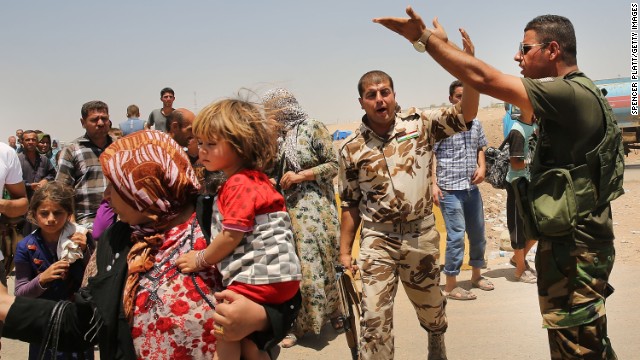 Iraqis who fled fighting in the cities of Mosul and Tal Afar try to enter a temporary displacement camp in Khazair on Wednesday, July 2.
Iraqis who fled fighting in the cities of Mosul and Tal Afar try to enter a temporary displacement camp in Khazair on Wednesday, July 2.  Peshmerga fighters check cars at the entrance of a temporary displacement camp in Khazair on Thursday, June 26.
Peshmerga fighters check cars at the entrance of a temporary displacement camp in Khazair on Thursday, June 26. 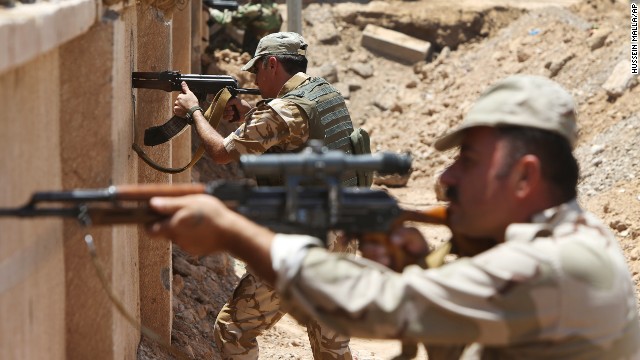 Kurdish Peshmerga take their positions behind a wall on the front line of the conflict with ISIS militants in Tuz Khormato, Iraq, on Wednesday, June 25.
Kurdish Peshmerga take their positions behind a wall on the front line of the conflict with ISIS militants in Tuz Khormato, Iraq, on Wednesday, June 25.  Peshmerga fighters clean their weapons at a base in Tuz Khormato on June 25.
Peshmerga fighters clean their weapons at a base in Tuz Khormato on June 25. 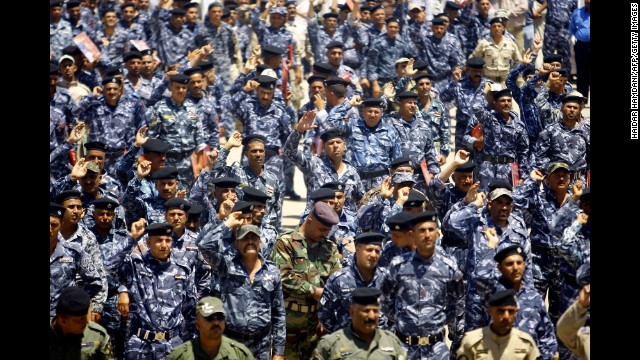 New army recruits gather in Najaf, Iraq, on Wednesday, June 18, following a call for Iraqis to take up arms against Islamic militant fighters.
New army recruits gather in Najaf, Iraq, on Wednesday, June 18, following a call for Iraqis to take up arms against Islamic militant fighters. 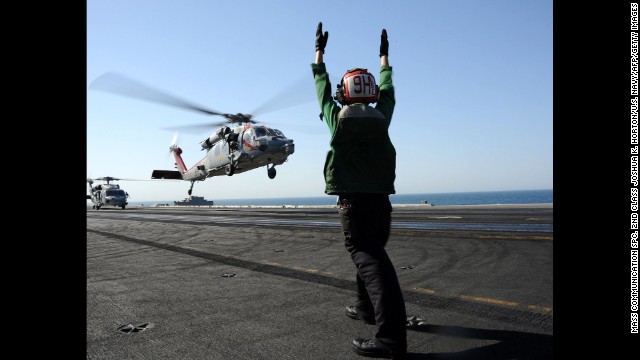 An MH-60R Sea Hawk helicopter lands on the aircraft carrier USS George H.W. Bush in the Persian Gulf on Tuesday, June 17.
An MH-60R Sea Hawk helicopter lands on the aircraft carrier USS George H.W. Bush in the Persian Gulf on Tuesday, June 17. 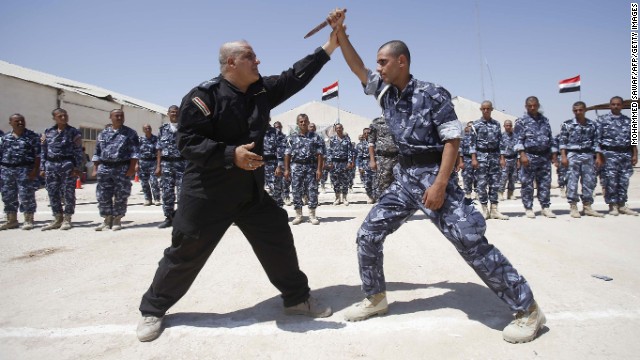 Newly recruited Iraqi volunteer fighters take part in a training session in Karbala, Iraq, on June 17.
Newly recruited Iraqi volunteer fighters take part in a training session in Karbala, Iraq, on June 17. 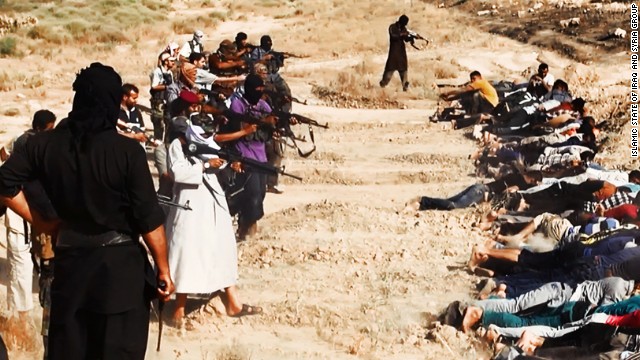 Members of ISIS prepare to execute soldiers from Iraq's security forces in this image, one of many reportedly posted by the militant group online. CNN cannot independently confirm the authenticity of the images.
Members of ISIS prepare to execute soldiers from Iraq's security forces in this image, one of many reportedly posted by the militant group online. CNN cannot independently confirm the authenticity of the images. 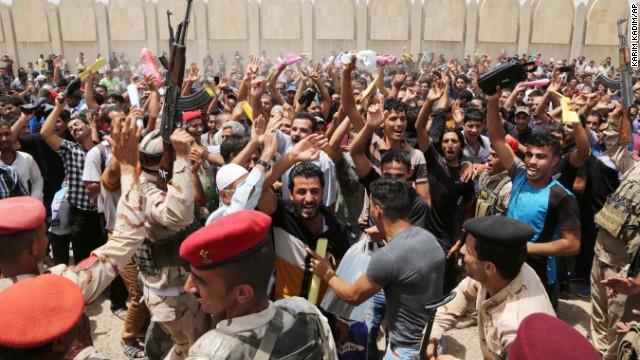 Iraqi men chant slogans outside of an army recruiting center to volunteer for military service Thursday, June 12, in Baghdad.
Iraqi men chant slogans outside of an army recruiting center to volunteer for military service Thursday, June 12, in Baghdad. 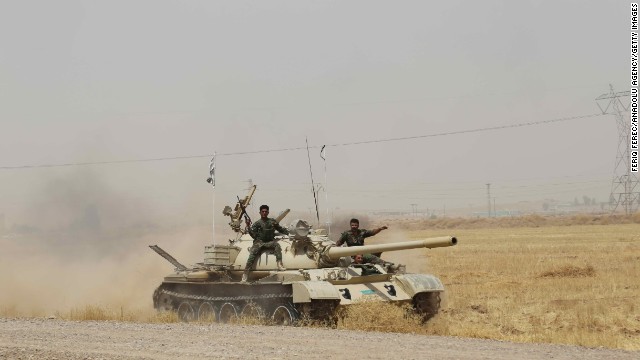 Kurdish Peshmerga forces, along with Iraqi special forces, deploy their troops and armored vehicles outside of Kirkuk, Iraq, on June 12.
Kurdish Peshmerga forces, along with Iraqi special forces, deploy their troops and armored vehicles outside of Kirkuk, Iraq, on June 12. 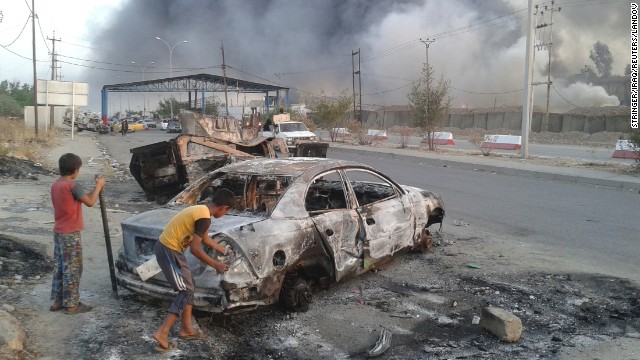 Children stand next to a burnt vehicle during clashes between Iraqi security forces and ISIS militants in Mosul on Tuesday, June 10.
Children stand next to a burnt vehicle during clashes between Iraqi security forces and ISIS militants in Mosul on Tuesday, June 10. 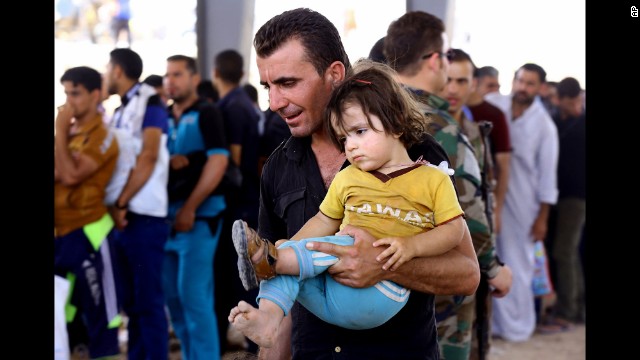 Civilians from Mosul escape to a refugee camp near Irbil, Iraq, on June 10.
Civilians from Mosul escape to a refugee camp near Irbil, Iraq, on June 10.  Photos: The ISIS terror threat
Photos: The ISIS terror threat "From the beginning of the campaign, we have said that we would expand this type of support to the Iraqi government should they act in a manner that was representative of the security interests of all Iraqis," Thomas said.
U.S. officials maintain that Iraqi support for Sunni tribes going on the offensive against ISIS will be a necessary part in the effort to defeat the militants, who are also called ISIL and refer to themselves as the Islamic State.
In a news conference with reporters Thursday, Gen. Martin Dempsey, the Joint Chiefs chairman, signaled the possibility of the new role when he said the Iraqi government had not yet requested U.S. military support in efforts to defend a Sunni tribe that has suffered mass executions at the hands of ISIS militants.
"That's why we need to expand the train-advise-and-assist mission into the Al- Anbar Province," Dempsey said. "But the precondition for that is that the government of Iraq is willing to arm the tribes."
Dempsey said the United States had "positive indications" the Iraqi government was prepared to do that, but had not yet acted.
Thomas said such a mission would hopefully open the door to the establishment of an Iraqi National Guard while also helping to push back ISIS control of the province.
There is no indication from Pentagon officials on when such a mission could begin.
Anbar was the scene of a bloody insurgency during the U.S.-led war in Iraq until an uprising by Sunni tribes in 2006 took hold to push out forces from al Qaeda's franchise in Iraq -- the precursor organization to ISIS.
Some 400 members of the Sunni Abu Nimer tribe in Anbar have been killed in recent days after rising up against ISIS rule in the province.
CNN's Jamie Crawford contributed to this report.
No comments:
Post a Comment